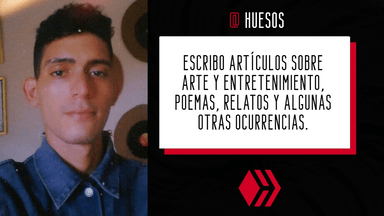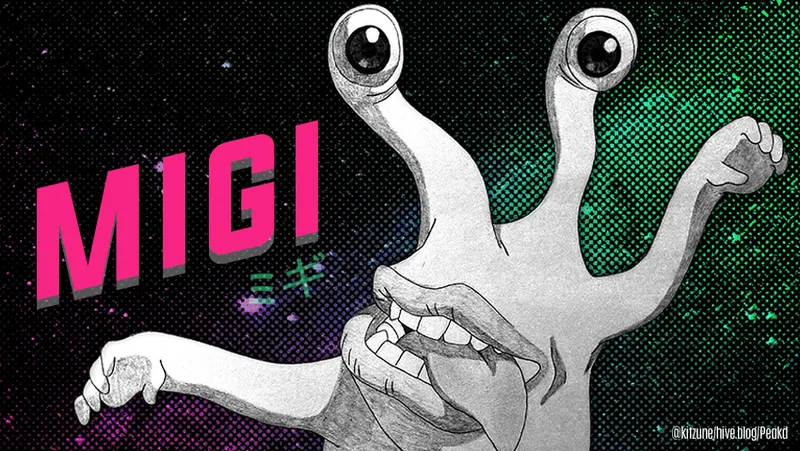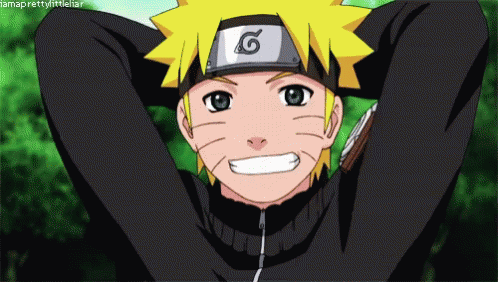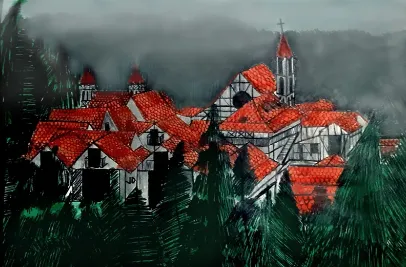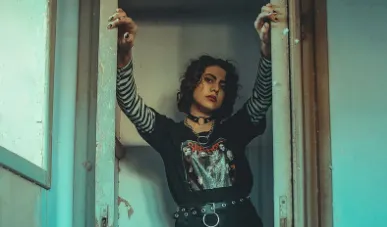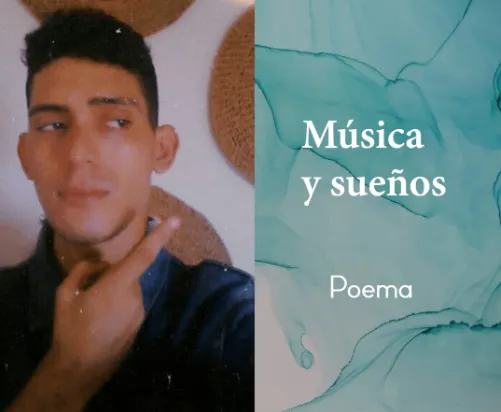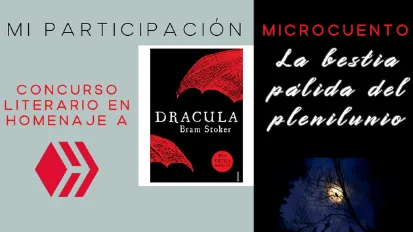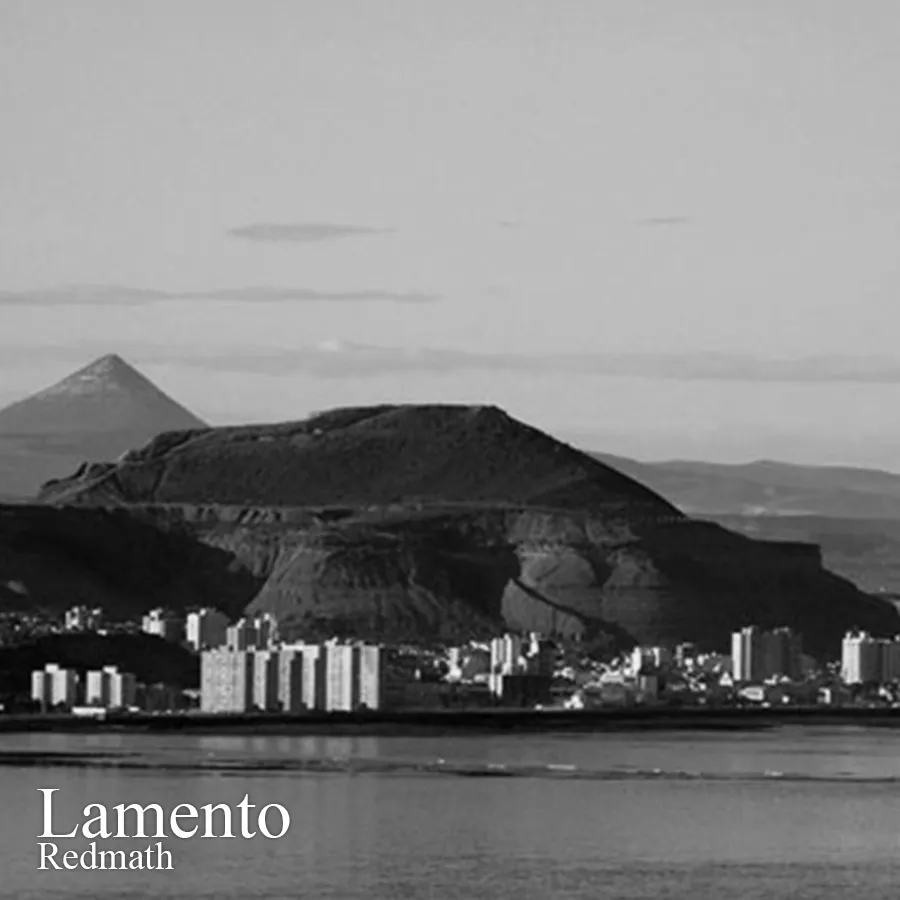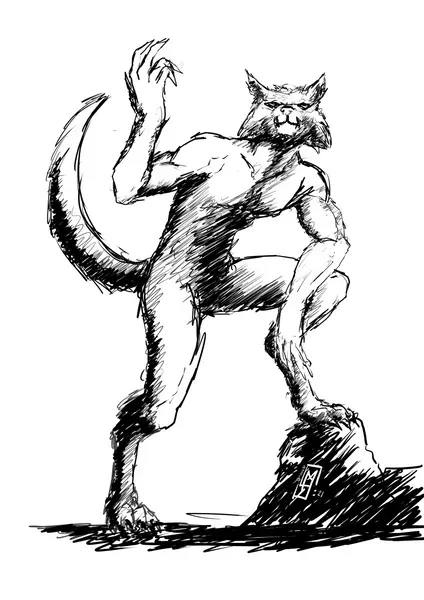ESP
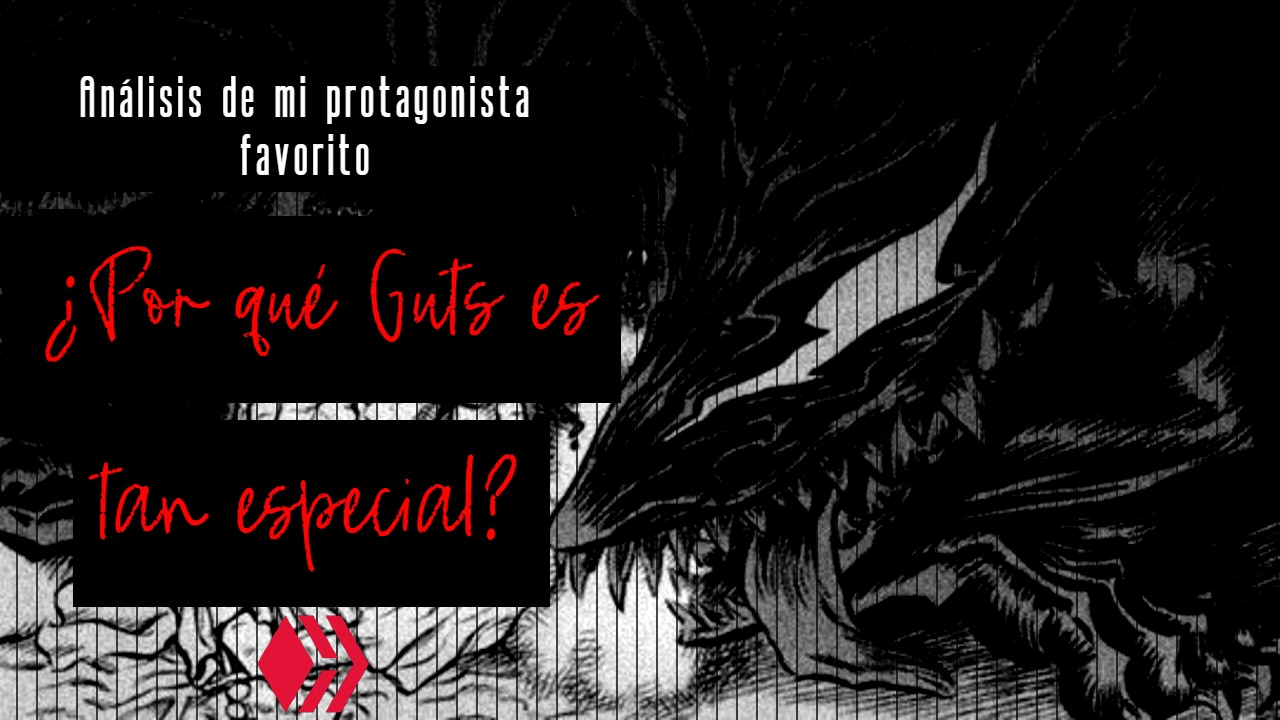
El legado continúa
Desde el fallecimiento del reconocido mangaka Kentaro Miura el pasado 6 de mayo, he estado haciendo un repaso por lo mejor de su obra magna: Berserk.
Conocí esta historia siendo un niño entrando a la adolescencia, y ya cuando me hice mayor me inicié en su universo con la poco apreciada serie de 2016. Muy buena en narrativa, pero infame en el aspecto de la animación.
No tardé en adentrarme en su mundo corriendo directamente a su fuente. En esa ocasión, la satisfacción fue absoluta. Rápidamente llegué a entender la notoriedad de Berserk como una de las historias esenciales del género de fantasía oscura y la demografía seinen (para adultos).
Uno de los aspectos más contrastantes entre lo que pude ver en el anime de 2016 y el manga que Miura desarrolló desde 1989, fue el hecho de que en los primeros capítulos del manga se le da una introducción correcta a Guts, su protagonista.
Todo inicia de modo muy parecido, pero el salto temporal que el manga hace hacia el pasado en el tercer capítulo, da inicio a un tremendo arco argumental que nos muestra los orígenes del antihéroe que protagoniza la historia.
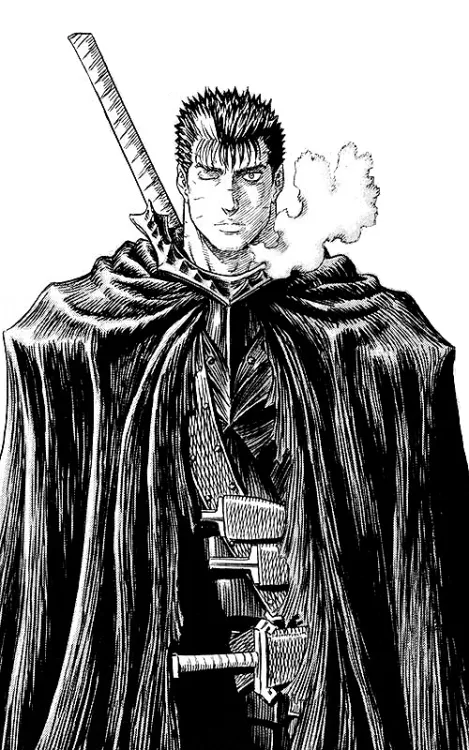
Un grandioso personaje nace de una gran idea
Miura llegó afirmar que al crear Guts su idea era darle vida a un héroe “diferente”. Miura tenía la esperanza de elaborar una obra que rompiese con los estereotipos impuestos por el manga de la época, pero sin dejar totalmente de lado las inspiraciones que lo habían formado como creativo.
Esa decisión no solo fue firme, sino que dio resultados excepcionales. Puede que hoy en día Guts no nos parezca tan innovador, pero en su momento era un personaje muy difícil de comparar con algún otro protagonista.
Si nos parece que Guts es en algún sentido típico, es seguramente porque ha influenciado directamente a muchos de los antihéroes más conocidos de nuestra era.
Ese logro era evidente en los primeros capítulos de Berserk, pero no fue hasta que se desarrolló todo el arco de su origen que Guts se convirtió en uno de los protagonistas más extraordinarios y mi gran favorito hasta ahora.
La historia de origen de Guts, la Edad de Oro, ha sido aclamada por muchos, incluyéndome, como uno de los mejores arcos argumentales jamás escritos. Y más allá de la genialidad creativa de Miura como guionista, fue su idea de hacer un héroe diferente la que permitió que esta historia particular fuese tan maravillosa.
Cabe aclarar que la Edad de Oro no es el arco que mejor representa lo que Berserk realmente es. Si aislamos este del resto de los arcos de Berserk, lo que nos queda es una historia de corte fantástico y medieval con un final trágico, no una fantasía oscura.
Pero este arco argumental es absolutamente necesario para entender a Guts y darle una exquisita profundidad a su personalidad y al mundo que le rodea. El desarrollo de Guts fue simplemente magistral, y te lo explíco resumidamente.
El oscuro origen del Espadachín Negro
Guts es un protagonista especial, se siente como tal, pero al dimensionar por qué es tan distinto es esencial entender su trasfondo.
Guts no solo es un personaje amargado que lucha para acabar con los apóstoles (humanos que adquirieron poderes demoniacos) y trata de consumar su deseo de venganza. Guts es la antítesis del héroe "elegido" en todo su esplendor, y esto está definido desde su nacimiento.
Mientras el héroe elegido suele gozar de una fortuna inaudita en algún punto de su historia y tiene una prosperidad y felicidad asegurada, Guts ha estado condenado toda su vida a vivir en extremo sufrimiento y todo se origina en el hecho de que ni siquiera debió haber nacido.
Ese es el mensaje que nos da Miura al mostrarnos la escena de su descubrimiento. Con una frase poética en una secuencia que establece el tono de los eventos por venir en la vida de aquel que nació de un cadáver. El destino de Guts era la muerte antes de que siquiera pudiese respirar por primera vez.
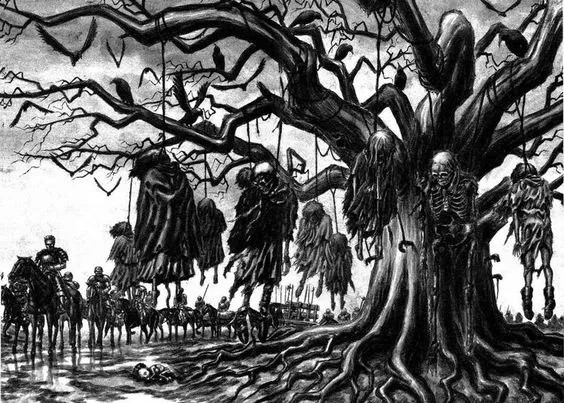
La Edad de Oro
Luego de otros eventos de gran infortunio, Guts se cría de un modo que justifica su alma de guerrero. Crece entre espadas, violencia, sangre, odio y traición. Pero dichos eventos no cambian nunca su esencia.
Cuando la madre adoptiva de Guts fallece, una mujer notablemente perturbada que se había encariñado con él, Guts siente la necesidad de estar con ella en sus últimos momentos. Aquí, por primera vez, vemos su verdadero carácter.
Por cierto, nos lo adelantan un poco en el manga con una expresión de tristeza que se le escapa y trata de ocultar de quien sería su fiel compañero: el elfo Puck.
Aunque años de terribles tragedias han desfigurado su personalidad hasta hacerlo tosco, gruñón, y sumamente narcisista —en cuanto habilidades de combate y supervivencia—, la verdad es que todos esos eventos solo le han hecho muy difícil expresar otros sentimientos, pero siempre están bajo la superficie.
Luego de conocer a Griffith, evento clave en toda la historia, la vida de Guts cambia para bien durante un cierto periodo. Aquí hay otra genialidad, y Miura parece querer responder en Berserk la siguiente pregunta:
¿Qué pasaría si la vida de alguien destinado a la desgracia se cruza con la de alguien destinado a la gloria?
Es que el elegido de la historia de Berserk es precisamente Griffith. Él es el héroe destinado a ser una luz para el mundo, y por algún motivo se obsesiona con Guts al punto de querer ser su "dueño" a toda costa.
Griffith recluta a Guts tras vencerlo en un duelo, ganado una apuesta que comprometía a Guts a servirle como guerrero. A partir de entonces, el protagonista de Berserk formó parte de la Banda del Halcón, iniciando un periodo de estabilidad en su vida gracias a estar bajo el mando del dichoso elegido.
Otro personaje que Guts conoce casi en el mismo momento es Casca, quien se convierte en su gran interés amoroso. Pero Guts no sabe ni entiende como expresarle su amor de un modo que no fuera protegerla cada vez que hiciera falta.
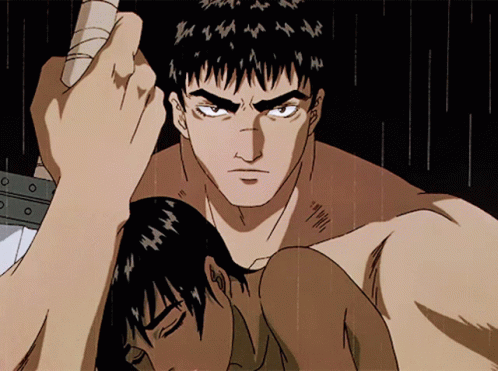
Guts adquiere el título de "Asesino de 100 Hombres" intentando, con éxito, proteger a Casca mientras estaba enferma. Pero fue mucho más adelante que ella notó esa actitud, y fue entonces que el amor que sentía Guts se hizo recíproco.
Pero nada iba bien para entonces. Griffith había causado una gran molestia en Guts, quien no estaba cómodo con la vida de aristocracia y opulencia a la que Griffith los había conducido. Entonces Guts, queriendo ser libre para vivir a su manera, decide irse.
Fue en otro duelo que el destino de Guts volvería a cambiar de rumbo. En esa ocasión, él venció. Tomó las riendas de su vida a partir de ahí y se alejó de Griffith y la Banda del Halcón por al menos un año.
Griffith no estaba acostumbrado a perder, era el elegido, su destino era ser rey, y no supo digerir su derrota. Griffith cayó en una depresión tan profunda que perdió el control de sí mismo. Cuando Guts lo encontró nuevamente, había cometido la locura de inmolarse al ofender al rey acostándose con su hija.
Tal vez estaba predestinado. Tal vez Griffith no actuó sino a sabiendas de que todo el sufrimiento que ese acto causaría iba a ser bien recompensado. Pero cuando Guts lo encontró de nuevo, era apenas un escuálido despojo humano sin capacidad de ponerse de pie por sí mismo.
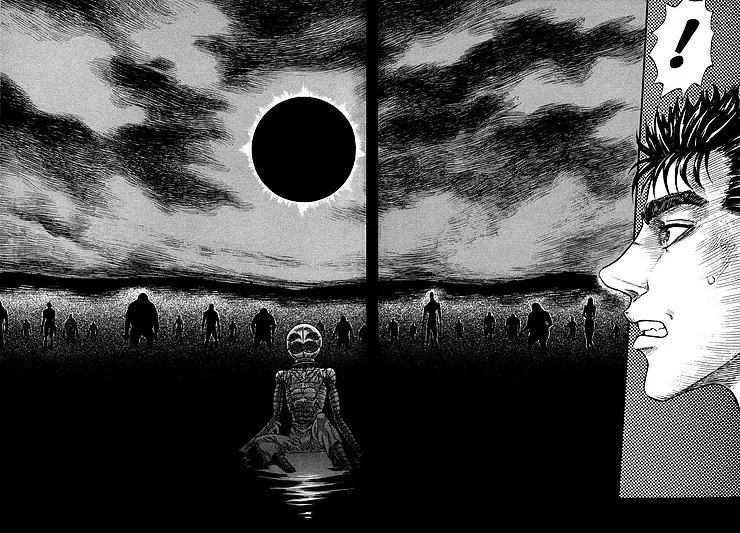
La Séptima Capa
El eclipse y sus consecuencias
Casca y Guts sufrieron mucho al descubrir estado de salud de Griffith. Por eso lo que él hizo después fue, más que crueldad, una insólita bajeza. El destino de Griffith, y su más grande sueño, era ser rey, y haría todo para lograr su objetivo.
Cuando inicia el eclipse, evento crucial de la historia de Berserk, Griffith había estado a punto de suicidarse y darse por vencido. Pero no lo hizo, y cuando el sol fue al fin cubierto su sueño se cumplió, pero para eso tuvo que hacer un gran sacrificio.
Todos los miembros de la Banda Del Halcón, salvo Guts y Casca, formaron parte de un espantoso banquete para demonios. Casca es abusada por Griffith delante de Guts quien, desesperado por salvarla, corta su brazo izquierdo atrapado entre las fauces de un demonio, pero eso no fue suficiente.
Lo último que vio el ojo derecho de Guts fue el perverso acto ritual de Griffith. Luego de eso, Guts despierta cubierto de heridas, con solo un ojo, solo un brazo, el amor de su vida tan perturbada que no lo reconocía, y además sería eternamente perseguido por espíritus malignos porque estaba marcado como un sacrificio humano; como su comida.
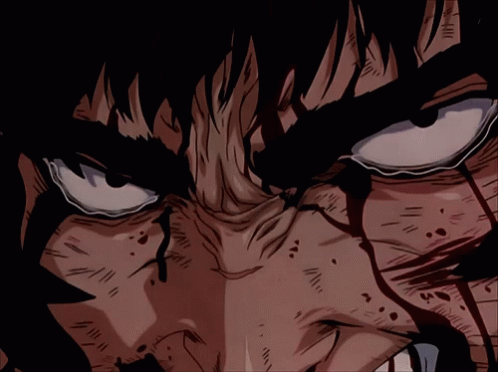
Un protagonista asombroso
Guts supera el evento del eclipse al convertirse en el errante y solitario espadachín negro mientras vive un absoluto infierno. No tiene paz ni en sus sueños. Guts busca venganza, pero a lo largo de los arcos de Berserk sus motivaciones se van moldeando y empiezan a tornarse más nobles. Guts se hace leyenda y héroe a pesar de todo lo que sufre.
La evolución de Guts es demasiado coherente y nos deja muy claras las razones de su arquetipo. Guts no solo es un antihéroe con un pasado oscuro, es alguien que es empujado por una fuerza superior que controla el destino de todo. Algo que en el universo Berserk es conocido como “Causalidad”.
Lo que define a Guts es su gran fuerza de voluntad, pero en lugar de ayudarlo solo complica más su camino. Él debió morir en muchas ocasiones, pero sigue adelante y no deja de hacerlo incluso ante inmenso dolor y sufrimiento. La voluntad de Guts es más fuerte que la propia muerte.
Todo eso tiene un impacto en la vida real. Mientras planificada lo que he presentado en este post me encontré con algo que me hizo reflexionar más profundamente sobre el rol Guts ha tenido en mi vida.
Guts tuvo un gran impacto en mi proceso de duelo
Anoche, mientras hacía scrolling en Facebook como si no tuviese nada importante por hacer, me encontré con este post:
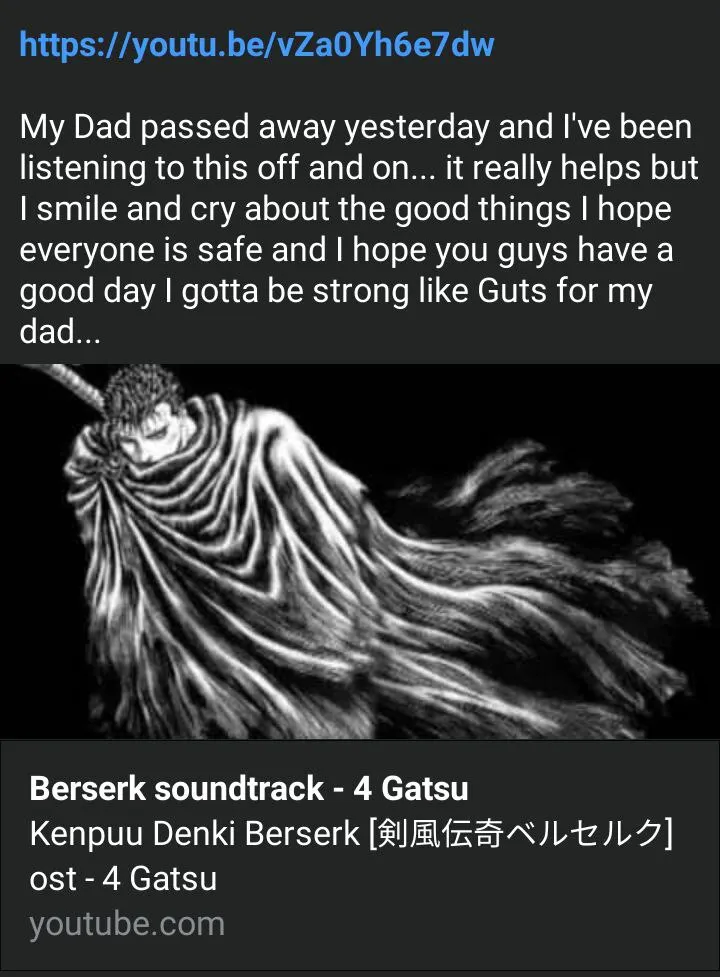
Mi padre falleció ayer y he estado escuchando esto. Realmente me ayuda, pero sonrío y lloro sobre las cosas buenas. Espero que todos estén bien y espero que ustedes tengan un buen día. Debo ser fuerte como Guts por mi papá.
Esta persona refleja exactamente lo que he sentido durante los últimos meses. Tal vez le he dado tanta importancia al fallecimiento de Kentaro Miura porque Berserk me genera una sensación que me reconforta. Algo que necesitaba al haber vivido recientemente la pérdida de no uno, sino varios seres queridos entre los que se encuentra mi padre.
Al igual que el autor de este post, yo he hallado en Guts la inspiración para seguir adelante sin importar lo que pase. La historia de Berserk está plagada de desgracias, y Guts sufre de eventos traumaticos con demasiada frecuencia, pero resiste y nunca deja de luchar.
Se supone que eso debe hacer un héroe de ficción, inspirarnos, pero la mayoría de estos suelen estar hechos para inspirar, principalmente, a personas que no han contado más de una o dos décadas de vida.
No es que las desgracias sean ajenas a la vida de los niños, pero el pasar de los años nos va comprometiendo emocionalmente mientras las figuras que fueron importantes para formarnos, quizás como héroes de la vida real, desaparecen y nos dejan con un gran vacío.
A pesar de todo seguimos aquí. Yo redacto este texto que te haré llegar como lector con la esperanza de transmitir, más que una explicación de por qué amo tanto a Guts como personaje, el mayor mensaje que pienso que Miura nos ha dejado con lo que concibió en Berserk.
Kentaro Miura no completó su obra, pero su legado no deja de crecer. La huella que dejó en el mundo con Berserk abarca todas las formas de arte, y el arte no resulta más que la expresión de la pura inspiración de cada artista.
En medio de una pandemia que ha provocado la pérdida de tantos de nuestros seres queridos, yo me he visto inspirado por Miura, por Guts, pensando que no puedo rendirme a los sentimientos de dolor y pena.
Detrás de todo el gore, el horror, de toda la carnicería que hallamos en Berserk desde el primer capítulo, hay una brillante luz de fortaleza que me ha hecho mucho bien. Por todo eso y más, Guts es mi protagonista favorito y Kentaro Miura es, para mí, un gran maestro en el arte de crear buenas historias.

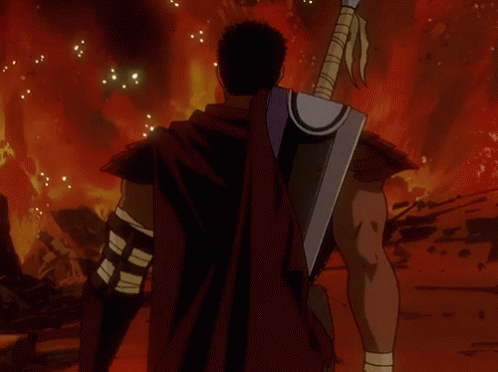
Cuídate y cuida a quienes amas. Te felicito por llegar hasta aquí. Ten en cuenta que no estás solo y puedes lograr mucho más. Sigue adelante.
Lee también:
La leyenda de Kentaro Miura
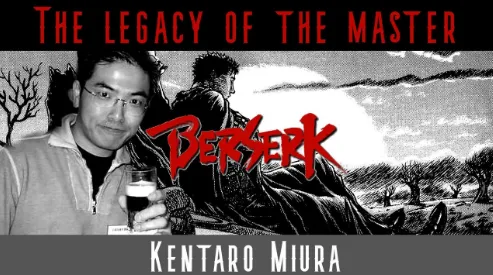
La Edad de Oro: Tres versiones de la obra maestra de Miura y cómo las debes ver (Sin spoilers) [ESP-ENG]
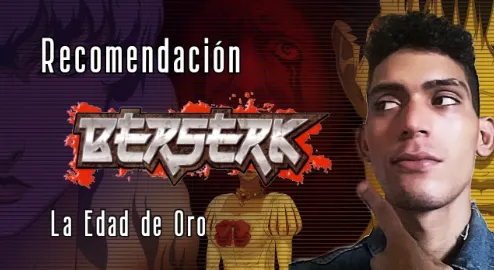

ENG
The legacy continues
Since the passing of renowned mangaka Kentaro Miura on May 6, I've been reviewing the best of his magnum opus: Berserk.
I was introduced to this story as a kid entering my teens, and as I grew into adulthood I was introduced to his universe with the under-appreciated 2016 series. Very good in the storytelling, but infamous in the animation side.
It didn't take me long to delve into his world by running directly to its source. On that occasion, the gratification was absolute.I quickly came to understand the notoriety of Berserk as one of the essential stories of the dark fantasy genre and the seinen (adult) demographic.
I quickly came to understand the notoriety of Berserk as one of the essential stories of the dark fantasy genre and the seinen (adult) demographic.
One of the most contrasting features between what I was able to see in the 2016 anime and the manga that Miura developed since 1989, was the fact that in the early chapters of the manga, Guts, its protagonist, is given a proper introduction.
Everything starts in a very similar way, but the time jump that the manga makes into the past in the third chapter, initiates a tremendous story arc that shows us the origins of the antihero who is the protagonist of the story.

A great character is born from a great idea.
Miura actually went in to claim that when creating Guts his idea was to make a "different" hero come to life. Miura hoped to craft a work that would break away from the stereotypes imposed by the manga of the time, but without completely disregarding the inspirations that had shaped him as a creative.
That decision was not only firm, but it yielded exceptional results. Guts may not seem so innovative today, but at the time he was a character very difficult to compare with any other protagonist. If Guts seems to us to be in any sense typical, it is surely because he has directly influenced many of the best-known anti-heroes of our era.
That achievement was evident in the early chapters of Berserk, but it wasn't until his entire origin arc unfolded that Guts became one of the most extraordinary protagonists and my great favourite so far.
Guts' origin story, the Golden Age, has been hailed by many, including myself, as one of the best story arcs ever written. And beyond Miura's creative genius as a screenwriter, it was his idea of making a different hero that allowed this particular story to be so wonderful.
It should be clarified that The Golden Age is not the arc that best represents what Berserk really is. If we isolate this one from the rest of the Berserk arcs, what we're left with is a fantasy and medieval story with a tragic ending, not a dark fantasy.
But this story arc is absolutely necessary to understand Guts and give exquisite depth to his personality and the world around him. The development of Guts was simply masterful, and I'll explain it in a nutshell.
The dark origins of the Black Swordsman
Guts is a special protagonist, he feels like one, but to dimension why he is so different it is essential to understand his backstory.
Guts is not just a dark character who fights to wipe out the apostles (humans who acquired demonic powers) and tries to consummate his desire for vengeance. Guts is the antithesis of the "chosen" hero in all his splendor, and this is defined from his birth.
While the chosen hero usually enjoys unheard-of prosperity at some point in his history and has assured wealth and happiness, Guts has been doomed all his life to live in extreme suffering and it all stems from the fact that he shouldn't even have been born.
That is the message Miura gives us by showing us the scene of his discovery. With a poetic phrase in a sequence that sets the tone for the events to come in the life of the one who was born from a corpse. Guts' fate was death before he could even take his first breath.

The Golden Age
After other events of great misfortune, Guts is raised in a way that justifies his warrior soul. He grows up among swords, violence, blood, hatred and betrayal. But such events never change his essence.
When Guts' adoptive mother passes away, a notoriously disturbed woman who became attached to him, Guts feels the need to be with her in her final hours. Here, for the first time, we see his true nature.
By the way, we get a preview of it in the manga with an expression of sadness that leaks out of him and he tries to hide from the one who would be his faithful companion: the elf Puck.
Although years of terrible tragedies have disfigured his personality to the point of making him coarse, grumpy, and extremely narcissistic -in terms of combat and survival skills-, the truth is that all those events have only made it very difficult for him to express other feelings, even though they are always under the surface.
After meeting Griffith, a key event in the whole story, Guts' life changes for the better for a certain period. Here's another stroke of genius, and Miura seems to want to answer in Berserk the following question:
What would happen if the life of someone destined for misfortune intersects with the life of someone destined for glory?
It is precisely Griffith who is the chosen one in the story of Berserk. He is the hero destined to be a light to the world, and for some reason he becomes obsessed with Guts to the point of wanting to "own" him at all costs.
Griffith recruits Guts after defeating him in a duel, winning a bet that committed Guts to serve him as a warrior. From then on, the protagonist of Berserk became part of the Band of the Hawk, initiating a period of stability in his life thanks to being under the command of the blessed chosen one.
Another character Guts meets almost at the same moment is Casca, who becomes his great romantic interest. But Guts doesn't know or understand how to express his love for her in any other way than to protect her whenever necessary.
 .
.
Guts acquires the title of "100 Man Killer" by attempting, successfully, to protect Casca while she was ill. But it was much later that she noticed that behavior, and it was then that the love Guts felt was mutual.
But nothing was going well by then. Griffith had caused great irritation in Guts, who wasn't comfortable with the life of aristocracy and opulence to which Griffith had led them. So Guts, wanting to be free to live his own way, decides to leave.
It was in another duel that Guts' destiny would again change course. On that occasion, he won. He took the reins of his life from there and walked away from Griffith and the Band Of The Hawk for at least a year.
Griffith was not used to losing, he was the chosen one, his destiny was to be king, and he did not know how to handle his defeat. Griffith fell into such a deep depression that he lost control of himself. When Guts found him again, he had committed the folly of sacrificing himself by offending the king by sleeping with his daughter.
Perhaps it was predestined. Perhaps Griffith acted only in the knowledge that all the suffering that act would cause would be well rewarded. But when Guts found him again, he was barely a scrawny human wreck with no ability to stand up for himself.

The Seventh Layer
The eclipse and its aftermath
Casca and Guts suffered greatly upon discovering Griffith's condition. That is why what he did next was, more than cruelty, an unusual baseness. Griffith's destiny, and his greatest dream, was to be king, and he would do everything to achieve his goal.
When the eclipse begins, a crucial event in the story of Berserk, Griffith had been on the verge of committing suicide and giving up. But he didn't, and when the sun was finally covered his dream was fulfilled, but for that he had to make a great sacrifice.
All the members of the Band Of The Hawk, except Guts and Casca, became part of a horrific feast for demons. Casca is abused by Griffith in front of Guts who, desperate to save her, cuts off her left arm caught in the jaws of a demon, but that wasn't enough.
The last thing Guts' right eye saw was Griffith's perverse ritualistic act. After that, Guts wakes up covered in wounds, with only one eye, only one arm, the love of his life so disturbed that she didn't recognize him, and also he would be eternally haunted by evil spirits because he was marked as a human sacrifice; as their food.

An amazing protagonist
Guts overcomes the eclipse event by becoming the wandering, lonely black swordsman while living an absolute hell. He has no peace even in his dreams. Guts seeks revenge, but over the course of the Berserk arcs his motivations are shaped and begin to become more noble. Guts becomes a legend and a hero despite all that he suffers.
Guts' evolution is all too consistent and makes the motivations of his archetype very clear to us. Guts is not only an anti-hero with a dark past, he is someone who is pushed by a superior force that controls the destiny of everything. Something that in the Berserk universe is known as "Causality".
What defines Guts is his great willpower, but instead of helping him it only complicates his path more. He must have died on many occasions, but he keeps going and doesn't stop even in the face of immense pain and suffering. Guts' will is stronger than death itself.
All of that has an impact on real life. While planning what I have presented in this post I came across something that made me reflect more deeply on the role Guts has had in my life.
Guts had a huge impact on my grieving process
Last night, while scrolling through Facebook as if I had nothing important to do, I came across this post:

This person reflects exactly how I've been feeling for the past few months. Maybe I've given so much importance to Kentaro Miura's passing because Berserk generates a feeling that comforts me. Something I needed having recently experienced the loss of not one, but several loved ones including my father.
Like the author of this post, I have found in Guts the inspiration to keep going no matter what. Berserk's story is riddled with misfortune, and Guts suffers from traumatic events all too often, but he endures and never stops fighting.
That's that's what a fictional hero is supposed to do, inspire us, but most of these are usually meant to inspire, primarily, people who haven't counted more than a decade or two of life.
It is not that misfortunes are alien to the lives of children, but the passing of the years is emotionally compromising while the figures that were important to form us, perhaps as real life heroes, disappear and leave us with a great emptiness.
In spite of everything we are still here. I write this text that I will pass on to you as a reader in the hope of conveying, more than an explanation of why I love Guts so much as a character, the biggest message I think Miura has left us with what he created in Berserk.
Kentaro Miura didn't complete his work, but his legacy never stops growing. The impact he made on the world with Berserk encompasses all forms of art, and art is nothing more than the expression of the pure inspiration of each artist.
In the face of a pandemic that has resulted in the loss of so many of our loved ones, I have been inspired by Miura, by Guts, thinking that I cannot give in to the feelings of pain and grief.
Behind all the gore, the horror, all the carnage we find in Berserk from the very first chapter, there is a bright light of strength that has done me so much good. For all that and more, Guts is my favourite protagonist and Kentaro Miura is, for me, a great master in the art of creating good stories.

Take care of yourself and those you love. I congratulate you for making it this far. Keep in mind that you are not alone and you can accomplish so much more. Keep going.
Read also:
The Legend of Kentaro Miura

The Golden Age: Three Versions of Miura's Masterpiece and How You Should See Them (No spoilers)


✎ Edición de | Edition by: @huesos with Pixlr Photo Editor
✂️ Separador | Separator: @huesos
